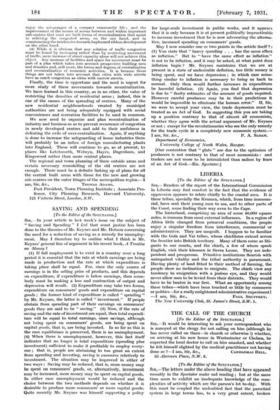LIBERIA
[To the Editor of the SPECTATOR.] Sin,—Readers of the report of the International Commission in Liberia may find comfort in the fact that the evidence of oppression appears to relate- chiefly to the coastal area. It is these tribes, specially the Krumen, which, from time immemo- rial, have sent their young men to sea, and to other parts of the Coast, some finding their way even to the Cape.
The hinterland, comprising an area of some 40,000 square miles, is immune from most external influences. In a region of Africa little changed from primeval conditions, the people enjoy a singular freedom from interference, commercial or administrative. They are unspoilt. I happen to be familiar with the Gola and Vai tribes, whose chiefdoms extend across the frontier into British territory. Many of them come as liti- gants to our courts, and the chiefs, a few of whom speak English, visit their kinsmen in Sierra Leone. They are inde- pendent and prosperous. Primitive institutions flourish with unimpaired vitality and the tribal authority is paramount. Having plenty of land fitted to their method of farming, the people show no inclination to emigrate. The chiefs view any tendency to emigration with a jealous eye, and they would never allow men to be levied from their districts. They would have to be beaten in war first. What an opportunity among these tribes—which have been touched so little by commerce or politics—for a really enlightened administrative experiment!










































 Previous page
Previous page